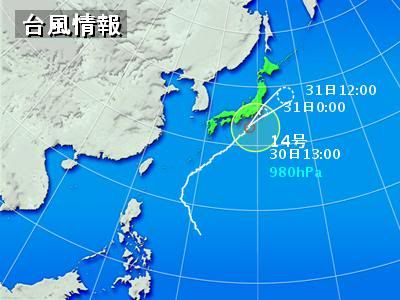December 23, 2010
今年の漢字 Kotoshi no Kanji = Kanji of the year
みなさん、こんにちは!
The Kanji of the year (Kotoshi no Kanji) is a kanji chosen by the Japanese Kanji Proficiency Society (Zaidan hōjin Nihon Kanji Nōryoku kentei kyōkai) through a national ballot in Japan. It began in 1995. The character with the most votes is selected to represent the events of that year, and is announced in a ceremony on December 12 (Kanji Day) at Kiyomizu Temple.
Wikipedia
今年の漢字(ことしのかんじ)は、財団法人日本漢字能力検定協会が、毎年12月12日(ずれる場合もあり)の「漢字の日」に発表している、その年の日本や世界の世相を表した漢字一字のことである。
Wikipedia
財団法人(ざいだんほうじん): foundation
日本(にほん)漢字能力(かんじのうりょく)検定協会(けんていきょうかい):
the Japanese Kanji Proficiency Society
毎年(まいとし): every year
ずれる: give or take
場合(ばあい): case
発表(はっぴょう)する: announce
世界(せかい): world
世相(せそう): social situation
表(あらわ)す: represent
今年の漢字は「暑」
今夏の平均気温は統計史上最高を記録。
平均(へいきん): average
気温(きおん): air temperature
統計(とうけい): statistics
史上(しじょう)最高(さいこう)を記録(きろく): an all-time record猛暑で熱中症にかかる人が続出したことや、チリ鉱山の落盤事故で作業員33人が暑い中を生き延びたことなどが理由に挙がった。
猛暑(もうしょ): extremely [intensely] hot
熱中症(ねっちゅうしょう): heat stroke
続出(ぞくしゅつ): appear one after another
鉱山(こうざん): mine
落盤(らくばん)事故(じこ): a collapse accident
作業員(さぎょういん): workers
生(い)き延(の)びた: survive
など: and others
理由(りゆう)に挙(あ)がる: name reasons
共同ニュース
今年は本当に暑かったです!(>_<)
December 21, 2010
冬至(とうじ) Toji = Winter solstice
みなさん、こんにちは!
Tomorrow, 22nd (Wed) is "Toji" = Winter solstice.
Toji is the day of the shortest day-time and longest night-time.
In Japan, it is said that if you eat pumpkin and take a Yuzu bath on the day, you won’t catch cold in the next year.

カピバラ Capybara is taking a Yuzu bath. (this zoo is in Izu)
msn news
明日22日(水)は冬至(とうじ)です。
冬至は1年の間で昼が最も短くそして夜が最も長くなる日です。
1年(ねん)の間(あいだ): throughout a year
昼(ひる): day time
最(もっと)も: the most/least
短(みじか)く: adverbial usage/form of 短い
そして: and then
夜(よる): night time
長(なが)く: adverbial usage/form of 長い
夜が最も長くなる日: the day that is the longest night
そして冬至の日にゆず湯に入ってかぼちゃを食べると1年間かぜをひかないと言われています。
ゆず: Yuzu, a kind of citrus fruit that has strong aroma
and very bitter
ゆず湯(ゆ): put some Yuzu into bathtub that add good aroma
and vitamins
かぼちゃ: pumpkin
食(た)べると~: if you eat it then ~
かぜをひかない: do not catch cold
~といわれています: it is said that ~

ゆず: Yuzu
December 19, 2010
東京クリスマス・イルミネーション2010 Tokyo Christmas Illuminations 2010
みなさん、こんにちは!
もうすぐクリスマスですね!
もうすぐ: soon
今いろいろなところでクリスマス・イルミネーションが見られます。
今(いま): now
いろいろなところ: various places
見(み)られます: can see
るるぶ.com イルミネーション・スポット 2010 東京

東京タワー Tokyo Tower

新宿アイランド Shinjuku I・Land

六本木ヒルズ Roppongi Hills

お台場 Odaiba

カレッタ汐留 Caretta Shiodome

帝国ホテル Imperial Hotel Tokyo
Difference between 「見られる」 vs 「見える」
If you want to see the thing, use 「見られる」.
ex. ちょっと遠いけどあの動物園に行けばペンギンパレードが見られるよ。
(The zoo is a little bit far from here but you can see “Penguin Parade”
there.) -> You want to see the parade.
ちょっと: a little bit
遠(とお)い: far
動物園(どうぶつえん): zoo
行(い)けば: if you go
ex. このホテルは駅から近くていいけど、窓から汚いゴミ置き場が見えるよ。
(I like this hotel as it is close to the station but you see a dirty garbage
pickup site from the window.)
駅(えき): station
近(ちか)くていい: close and good, adjective connective
窓(まど): window
汚(きたな)い: dirty
ゴミ置(お)き場(ば): garbage pickup site, garbage gathering place
December 13, 2010
ノルウェーの森 Norwegian Wood
みなさん、こんにちは!
村上春樹原作の「ノルウェーの森」の映画が11日から公開されました。
Norwegian Wood released on 11th (Sat).
村上(むらかみ)春樹(はるき): Haruki Murakami
原作(げんさく): original piece
映画(えいが): movie
公開(こうかい)された: released

The Tokyo Report
Norwegian Wood Trailer
2009年9月22日のBlog
December 4, 2010
がんばってくださいね!
みなさん、こんにちは!
忙しくてBlogが書けなくてごめんなさい。
明日JLPTを受けるみなさん、がんばってくださいね!
Sorry for not writing for a while I have been busy.
Gambatte for all who take JLPT tomorrow!
November 24, 2010
関西弁(かんさいべん)レッスン Kansai Dialect Lesson
みなさん、こんにちは!
おもしろい動画を見つけました。
I saw a funny movie here.
前に教えていた生徒さんも少し関西弁が話せました。
時々「ほんま?」と言っていました。
前(まえ)に: before
教(おし)えていた生徒(せいと)さん: the student I was teaching
少(すこ)し: a little bit
関西弁(かんさいべん): Kansai Dialect
話(はな)せました: could speak
時々(ときどき): sometimes
~と言(い)っていました: said ~
I had a student who could speak Kansai-ben.
He also said “Honma?” from time to time.
November 22, 2010
Into the unknown 「未知の領域に踏み込む日本」
みなさん、こんにちは!
今日はインターネットの記事を読んでみましょう。
ちょっと難しいかもしれません。
でも経済関係の語彙がたくさんありますから、役にたつと思います。
We will read an Internet article today.
It might be a little bit difficult.
But there are many vocabulary related to economy, hope it helps you.
The Economist : original article

英エコノミスト「未知の領域に踏み込む日本」
読売新聞 11月21日(日)3時4分配信
Yomiuri Shimbun, November 21st, 3:04 sent.
20日発売の英誌エコノミスト(本紙特約)は「未知の領域に踏み込む日本」と題した日本特集を掲載した。
発売(はつばい): release
英誌(イギリスし): UK magazine
本誌(ほんし): this paper, “Yomiuri Shimbun” in this context
特約(とくやく): special contracts
未知(みち): unknown
領域(りょういき): area, zone,
踏(ふ)み込(こ)む: step in, go further
~と題(だい)した: titled ~
日本特集(とくしゅう): feature Japan
掲載(けいさい)した: wrote, printed
少子高齢化が、日本経済の再活性化やデフレ脱却の大きな障害になっており、日本はこの問題に最優先で取り組む必要があると警告した。
少子(しょうし)高齢化(こうれいか): low birthrate and longevity
経済(けいざい); economy
再(さい)活性化(かっせいか): reactivation, revitalization
脱却(だっきゃく): cast off, out of
障害(しょうがい): obstacles
~になっており: “~になっている”のconnective
最優先(さいゆうせん): top priority
取(と)り組(く)む: work on
必要(ひつよう)がある: need to
~と警告(けいこく)した: give warning, alert
同誌の本格的な日本特集は、「日はまた昇る」と日本経済の再生に明るい見通しを示した2005年以来だ。
同紙(どうし): the magazine, ”The Economist” in this context
本格的(ほんかくてき)な: full scale
「日はまた昇(のぼ)る」: The Sun Also Rises
再生(さいせい): rebirth, revitalization
明(あか)るい見通(みとお)し: bright prospect, forecast
~を示(しめ)した: indicated
2005年(ねん)以来(いらい): since year 2005
対照的に今回は、若者が新卒で就職できないと一生厳しい状況が続く「一発勝負」の雇用の現状や、企業に残る階層構造など解決すべき課題は山積していると指摘した。
対照的(たいしょうてき)に: in contrast, contrastively
今回(こんかい): this time
若者(わかもの): young people, youth,
新卒(しんそつ): recent college grad, fresh from college
就職(しゅうしょく)できない: cannot find a job
一生(いっしょう): entire life
厳(きび)しい状況(じょうきょう): harsh conditions, difficult circumstances
~が続(つづ)く: continue
一発(いっぱつ)勝負(しょうぶ): one shot deal,
雇用(こよう): hiring, employment
現状(げんじょう): current condition, actual state
企業(きぎょう): corporate enterprise, company
~に残(のこ)る: remaining
階層(かいそう)構造(こうぞう): hierarchy strusture
解決(かいけつ)すべき: 解決しなければならない
problmes that needs to be solved,
課題(かだい): problem, task, challenge
山積(やまづ)み: have piled, abound
指摘(してき)した: brought up, pointed
その上、日本の「穏やかな衰退」を食い止めるには生産性の向上や女性の活用など「文化的な革命が必要」と結論付けた。
その上(うえ): on top of, in addition
穏(おだ)やかな: moderate, mild, slow
衰退(すいたい): fall, declination, fading
食(く)い止(と)める: to stop
~には: in order to ~
生産性(せいさんせい): productivity
向上(こうじょう): uplift, improvement
女性(じょせい): women
活用(かつよう): utilize, use
文化的(ぶんかてき)な: cultural
改革(かいかく): change, reform
結論(けつろん)付(づ)けた: concluded
November 15, 2010
日経新聞 Nikkei Shimbun (Japanese Economic Newspaper)
みなさん、こんにちは!
I think the number of non-Japanese speakers who speaks very good Japanese has increased.
I am impressed when I see someone who is reading Nikkei Shimbun (Japanese Economic Newspaper) or Japanese paperbacks on the train.
Nikkei Shimbun is short for Nihon Keizai(economy) Shimbum(newspaper) and often called Nikkei.
Many people who study Business Japanese want to be able to read Nikkei.
I read an article titled “Business people reading Nikkei which is ambitious and a very high bar”
Not to mention, this is about Japanese people.
It means they are trying so hard to read difficult Nikkei Shimbun.
I think one in suit on the train reading Nikkei on the train looks cool more than reading Manga.
Nikkei.com
日本語が上手な方が以前に比べて多くなった気がします。
Nikkei.com
日本語が上手な方が以前に比べて多くなった気がします。
日本語(にほんご)が上手(じょうず)な方(かた):
one who speaks Japanese very well
one who speaks Japanese very well
以前(いぜんに)比(くら)べて: compare to before
多(おおく)くなった: increase the number of
気(き)がする: feel like
電車の中で日経新聞や文庫本を読んでいる方を見ると、「おぉ!」と感心します。
電車(でんしゃ)の中(なか)で: on the train
日経(にっけい)新聞(しんぶん): Nikkei Shimbun
文庫本(ぶんこぼん): paperback book, pocketbook
~を読んでいる方(かた): one who reads ~
おぉ!: wow!,
感心(かんしん)します: admire, impress,
日経新聞は日本経済新聞の略で、よく日経と呼ばれています。
経済(けいざい): economy
略(りゃく): for short, abbreviated
~と呼(よ)ばれている: be called ~
そしてビジネス日本語を勉強している方は日経が読めるようになりたいという希望が多いですね。
そして: and
読(よ)めるようになりたい: want to become to be able to read
~という希望(きぼう): hope, wish, expect which is ~
「憧れるけどハードルが高い日経を読んでいるビジネスマン」というタイトルのインターネットの記事がありました。
憧(あこが)れる: long for, yearn
ハードルが高(たか)い: high bar
記事(きじ): article
これはもちろん日本人のことです。
つまり、難しい新聞をがんばって読んでいる、という意味です。
つまり: in other word
~という意味(いみ)です: it means that ~
November 7, 2010
漢字 かんじ Kanji
みなさん、こんにちは!
I will write about Kanji today.
Each language has each characteristic like difficult/easy pronunciation, grammars or letters/writing.
I have talked with an Arabic teacher before and he said “Japanese pronunciation and grammars are easy. But writing system especially Kanji is difficult. On the contrary, Arabic has less number of alphabets but its pronunciations are difficult.”
I know there are many people who do not like Kanji or not to want to study it.
And some of them can speak with native level of Japanese without knowing Kanji but I saw lots of cases they do not know difficult vocabulary.
Talking about foods, hobbies or works simply is not a problem and in fact we talk about those topics but difficult vocabulary is needed when you converse on difficult topics, business negotiations or when you talk about your thoughts and opinions.
Everyone would like to tell our thoughts logically not broken because we are adults.
There is a limitation study with your ears.
I think it is really hard for you to study Japanese grammars and Kanji, especially business persons.
Please do not study too hard, little by little, step by step!
今日は漢字について書きましょう。
今日(きょう): today
漢字(かんじ): Kanji
~について書(か)きましょう: I will write about ~
それぞれの言語にそれぞれの特徴があります。
それぞれのNoun: each Noun
言語(げんご): language
特徴(とくちょう): characteristic
例えば、発音が難しい/やさしい、文法が難しい/やさしい、文字が難しい/やさしいなど。
例(たと)えば: for example
発音(はつおん): pronunciations
難(むずか)しい: difficult
文法(ぶんぽう): grammars
文字(もじ): alphabets, writing
前にアラビア語の先生と話したことがありますが、その方は「日本語は発音も文法も簡単。だけど文字、特に漢字が難しい。
アラビア語は文字は少ないので簡単だけど、発音は難しい」と言っていました。
前(まえ)に: before
アラビア語(ご)の先生(せんせい): Arabic teacher, a teacher who teachers Arabic
~たことがあります: (express experience)
~も~も: also ~ and ~
その方(かた): the person (方is politer than 人)
簡単(かんたん): easy
だけど: but
特(とく)に: especially
漢字が嫌い、勉強したくない、という人もたくさんいると思います。
漢字を知らなくても、耳だけで覚えてネイティブレベルの会話ができる人もいますが、やはりそういう人は難しい語彙を知らない場合が多いです。
知(し)らない: do not know
~ても: even if ~
耳(みみ)だけで覚(おぼ)える: learn/master/memorize with only listening (by ear)
やはり: as expected
そういう人(ひと): the one who ~ (mentioned in the former part)
語彙(ごい): vocabulary
食べ物や趣味や日常生活、仕事について簡単に話したりすることは全然問題ないですし、実際そういうトピックが多いと思いますが、難易度の高い会話やビジネスでの交渉、自分の考えや意見を言う時など難しい語彙が必要になります。
食(た)べ物(もの): foods
趣味(しゅみ): hobbies
日常(にちじょう)生活(せいかつ): daily life
仕事(しごと): job, work, business
~や~や: (pick up things as example)
話(はな)す: to speak
~たり(~たり)する: do ~ (do ~) and so on
全然(ぜんぜん)問題(もんだい)ない: there is no problem at all
~し: (reason connective)
実際(じっさい): in fact, actually
多(おお)い: many
難易度(なんいど): difficulty level, degree of difficulty
交渉(こうしょう): negotiation
考(かんが)え: thoughts
意見(いけん): opinions
必要(ひつよう): necessary
~になる: become ~
大人ですから、ブロークンではなく自分の考えを論理的に伝えたいですね。
大人(おとな): adult
論理的(ろんりてき)に: logically
耳だけで勉強したり覚えたりするのは、限界があります。
覚(おぼ)える: memorize, remember
限界(げんかい): limit, limitation, barrier
日本語の文法も漢字も勉強するのは、特に仕事をしている人は、本当に大変だと思います。
本当(ほんとう)に: really
あんまりがんばりすぎないで、少しずつがんばってください。
~すぎる: exceeded, too much
少(すこ)しずつ: little by little
October 30, 2010
天気予報 台風14号 weather forecast Typhoon #14
みなさん、こんにちは!
We will read weather news today.
今日は天気予報を読んでみましょう。
今日(きょう): today
天気(てんき)予報(よほう): weather forecast
読(よ)んでみましょう: let's (try to) read
N2の文法がありますね。 がんばってください!
文法(ぶんぽう): grammars
The Typhoon #14 is heading to northeast direction which is now located in the west-southeast of Hachijo-jima island as of 11am.
It is expected to reach to Kanro region the most in the evening, the Meteorological Agency is warning heavy rain.
The strong-wind area of the typhoon #14 is getting wider.
From Shikoku island to Kanto region are in the strong-wind area, over 15m/second, it seems like it will keep blowing long even after the typhoon will have been gone.
From now on, in the even to 9pm, it will reach to Kanto region or land.

MBS News
台風14号は午前11現在、八丈島の西南西にあって北東方向に進んでいます。
午前(ごぜん)11時(じ)現在(げんざい): as of 11am
八丈島(はちじょうじま): Hachijo-jima island
西南西(せいなんせい): west-southwest
北東(ほくとう)方向(ほうこう): northeast direction
進(すす)んでいます: is moving
夕方には関東に最接近するとみられ、気象庁では大雨に対する警戒を呼びかけています。
夕方(ゆうがた): evening
関東(かんとう): Kanto region
最(さい)接近(せっきん): reaches the closest
~とみられ: is considered
気象庁(きしょうちょう): Meteorological Agency
大雨(おおあめ): heavy rain
N2 ~に対(たい)する: against, about
警戒(けいかい)を呼(よ)びかけている: giving a warning
台風14号は強風域がどんどん広がっていっているのが特徴です。
強風(きょうふう): strong wind
域(いき): area, zone
どんどん: rapidly
広(ひろ)がっている: is getting wider, bigger
~が特徴(とくちょう)です: has a charactaristic
午前11時現在は四国から関東地方の広い範囲が風速15メートル以上の強風域に入っていて、台風が抜けた後も長い間、強い風が吹くことになりそうです。
四国(しこく): Shikoku island
関東地方(ちほう): Kanto region
広(ひろ)い範囲(はんい): wide range
風速(ふうそく)15メートル: 15m/second
以上(いじょう): over, more than
抜(ぬ)けた後(あと): after it passes
長(なが)い間(あいだ): for a long time
風(かぜ)が吹(ふ)く: wind blows
N2 ~ことになりそうです: will probably end up
今後、夕方から午後9時ぐらいにかけて関東地方に接近、もしくは上陸するおそれがあります。
N2 ~から~にかけて: from~till~ (range with a vague beginning and end)
もしくは: or
上陸(じょうりく)する: to land
N2 恐(おそ)れがある: something bad is likely to happen
October 24, 2010
あなたも「寿司職人」になれます! You will be a Sushi Chef!
みなさん、こんにちは!
You will be able to be a “first class Sushi Chef”!
Tokyo sushi Academy has a 8 weeks Sushi Diploma course, 905,800yen(US$1000) with knives.
Speaking of Japanese cuisine, Sushi is very popular like it comes first to your mind and very popular.
It could be a good idea to start a business in your country when you will be able to speak Japanese and then become a Sushi Chef.
あなたも「一流の寿司職人」になれます!
一流(いちりゅう): first class
寿司(すし)職人(しょくにん): Sushi Chef
東京寿司アカデミーでは、寿司ディプロマコースが905,800円(包丁つき)で8週間で卒業できます。
包丁(ほうちょう)つき: with/including knives
8週間(しゅうかん): 8 weeks
卒業(そつぎょう): graduate
日本料理といえば寿司をイメージするぐらい人気がありますね。
日本料理(にほんりょうり): Japanese cuisine
~といえば: something that comes to mind when speaking on ~
人気(にんき)がある: popular
日本語が話せるようになって寿司職人になって、みなさんの国でビジネスを始めるのもいいかもしれませんね。
~が話(はな)せる: can speak ~(language)
~になる: become ~(occupation)
国(くに): country
ビジネスを始(はじ)める: start a business
~もいいかもしれません: it could be also good (suggesting softly)
DIPLOMA COURSE CURRICULUM
Almost of programs are hands on program with Japanese students.
Instructor who can speak English help your understanding.
1st Week
• Orientation
• How to sharp and maintenance knives
• Small fish preparation practice
• How to make sushi rice
• How to make nigirisushi
• Slice from fillet
• Thin roll

2nd Week
• Thin roll practice
• Shrimp preparation
• Frozen tuna preparation
• Squid preparation
• Nigiri practice

3rd Week
• Sea bream preparation
• Yellow tail preparation
• Tsukiji fish market tour
• Nigiri practice
• Vegetable cutting practice( cucumber )

4th Week
• Salmon preparation
• Octopus preparation
• West side of Japanese sushi
• Rolls
• Another traditional Japanese ingredient
• Omelet(Tamagoyaki)
• Exam

5th Week
• Kohada preparation
• Flounder preparation
• Vegitable cutting for advance
• Thin roll
• Traditional Japanese design roll
• Sushi chef hospitality and serve practice

6th Week
• Sea eel preparation
• Salmon preparation
• Frozen salmon preparation
• Sashimi practice and variety
• Sashimi exam

7th Week
• Japanese cuisine 1 tonkatsu, fried shrimp
• Japanese cuisine 2 soup, sauce, dressing etc
• Japanese cuisine 3 tempura,chawanmushi
• Sashimi review

8th Week
• Shells preparation
• Tuna preparation
• Nigiri exam
• Seasonal seafood preparation
• Review
• Sushi chef hospitality and serve practice
• Graduate

October 22, 2010
JLPT過去のデータ JLPT Past Data
みなさん、こんにちは!
JLPT過去4年のデータです。 JLPT Past 4 years data.
今度12月のテストはどうでしょうか。 がんばってくださいね!
応募者数 受験者数 認定者数 認定率(%)
N1(1kyu) Applicants Examinees Certified Certified (%)
----------------------------------------------------------------------------------------
2010 July 26,225 23,694 9,651 40.7%
2009 Dec 46,648 41,998 12,293 29.3%
2009 July 29,274 26,578 11,738 44.2%
2008 Dec 52,992 46,953 18,454 39.3%
2007 Dec 47,791 42,923 14,338 33.4%
----------------------------------------------------------------------------------------
N2(2kyu)
2010 July 24,738 23,126 13,768 59.5%
2009 Dec 36,528 33,807 12,462 36.9%
2009 July 26,437 24,793 9,279 42.8%
2008 Dec 41,924 38,040 16,289 42.8%
2007 Dec 34,782 31,805 11,884 37.4%
----------------------------------------------------------------------------------------
N3
2010 July 6,947 6,280 3,051 48.6%
----------------------------------------------------------------------------------------
N4(3kyu)
2009 Dec 17,703 16,675 9,360 56.1%
2008 Dec 22,016 20,351 13,304 65.4%
2007 Dec 16,808 15,710 8,664 55.1%
----------------------------------------------------------------------------------------
N5(4kyu)
2009 Dec 3,212 2,932 2,155 73.5%
2008 Dec 4,524 3,903 2,765 70.8%
2007 Dec 3,908 3,383 2,332 68.9%
October 21, 2010
how to expand your Japanese vocabulary 日本語の語彙力をアップさせるのには
みなさん、こんにちは!
If I would ask you “how can I expand my English vocabulary?” I wonder what your answers are.
I think most of people would probably answer reading newspapers or books.
On the contrary, if one was asked how to build Japanese vocabulary then the answer is most likely “to study Kanji” if he is a Japanese teacher.
I think it is very systematic because you can learn 4-5 vocabulary when you study one Kanji,
And also you can study Kanji step-by-step because Kanji books are sorted from easy to difficult ones.
もし私がみなさんに「英語の語彙力をアップさせるのにはどうしたらいいですか」と質問したら、みなさんの答えは何でしょうか。
もし~たら: if
私(わたし)がみなさんに~と質問(しつもん)したら:
英語(えいご):
語彙力(ごいりょく): word-hoard, lit meaning “power of vocabulary”
アップさせる: to increase, to make it higher
答(こた)え: answer
何(なん)でしょうか: politer/softer for「何ですか」
多分新聞や本を読む、と答える人が多いと思います。
多分(たぶん): probably, maybe
新聞(しんぶん)や本(ほん)を読(よ)む: to read newspapers or books
~と答える人: one who answer that ~
多(おお)い: many
~と思(おも)います: I think that ~
反対に「日本語の語彙力をアップさせるには」と聞かれたら、日本語教師なら間違いなく「漢字を勉強すること」と答えるでしょう。
反対(はんたい)に: on the other hand, on the contrary
日本語(にほんご): the Japanese Language
聞(き)かれたら: if I am asked
日本語教師(きょうし)なら: if he/she is a Japanese teacher
間違(まちが)いなく: definitely, lit meaning is “there are no mistakes”
漢字(かんじ)を勉強(べんきょう)する: to study Kanji
漢字を1つ勉強すると、4~5つ語彙も勉強することができるので、とてもシステマティックだと思います。
また漢字のテキストはやさしいものから難しいものになっていますから、ステップ・バイ・ステップで勉強できます。
難(むずか)しい: difficult
AからBになる: becomes from A to B
Subscribe to:
Posts (Atom)



